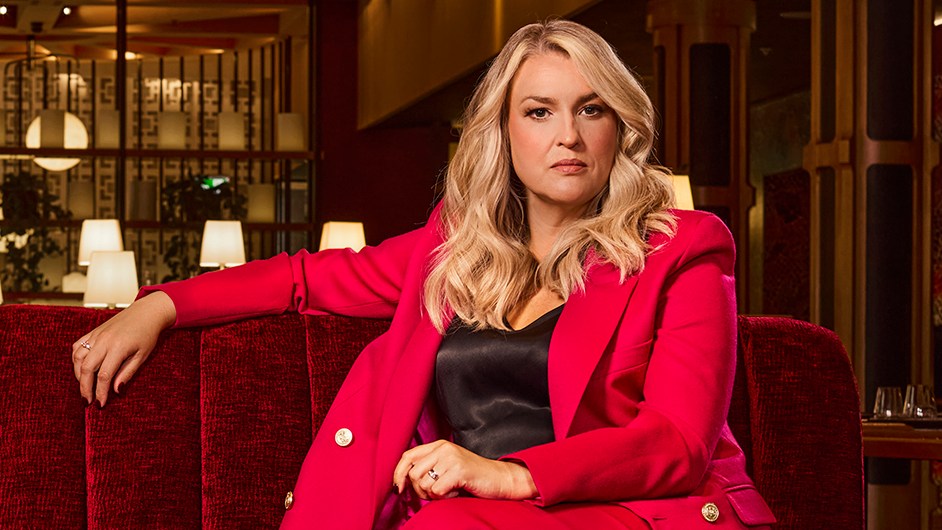At six years old, Sara Davies was already working, helping out after school in her parents’ decorating shop in Co Durham. By 12, she’d started her own business: knocking on doors to collect £2 a week from elderly neighbours living in sheltered accommodation — then, once a year, for the £104 they’d paid her, they’d get a room in their home redecorated.
“I would buy the wallpaper and paint cheap off my mum and dad, pay the decorator £50 and make about £20 profit on each house,” Davies says. “I was doing sales; I was learning to manage money. About eight weeks in, I had enough money to pay the decorator to start the first house, so I was managing cashflow.”
As an adult, not entirely surprisingly, she became an entrepreneur. “I learnt the entrepreneurial skills within the home, not in the education system,” she says. “Why are we not teaching kids about cashflow and profit and loss, and how to run a business? We need to show them how to do it.”
Not least, she believes, to face a future in which the workplace looks wildly different. “We need to teach people how to make their own money.”
Davies, 41, will be most familiar to fans of Dragons’ Den, where she has spent the past six years hearing pitches from hopeful contestants alongside Peter Jones, Deborah Meaden and Steven Bartlett.
• Sara Davies: ‘I built an extension to house my shoe collection’
With investments totalling more than £2.3 million, as a Dragon Davies has been drawn to innovative start-ups “with impact”, from a bank card for people with dementia to spiritual wellness brands and edible greetings cards for dogs.
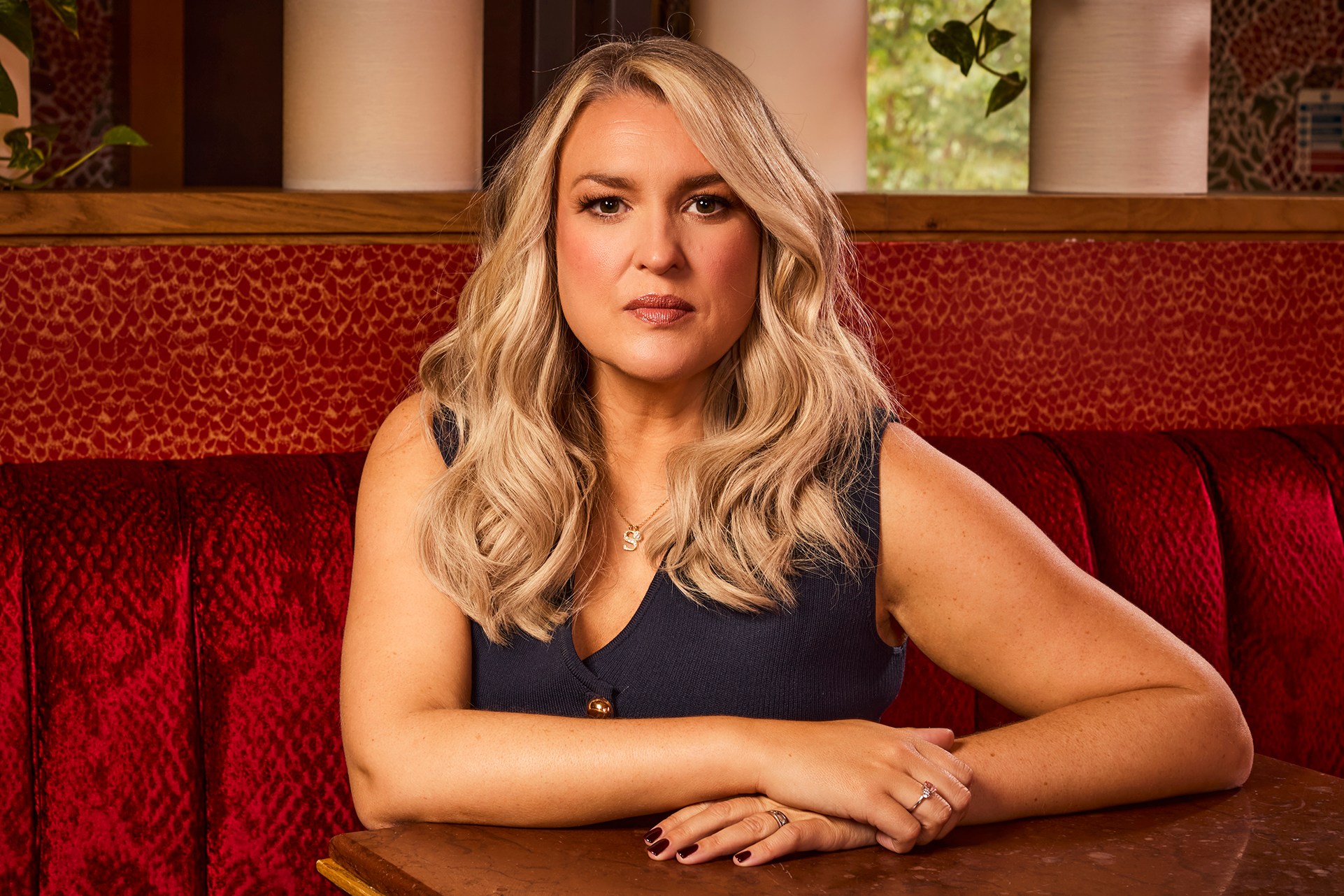
“I spent years being who I thought I should be, wearing navy blue Karen Millen business dresses”
JUDE EDGINTON FOR THE TIMES MAGAZINE
But the present series will be her last. Davies is stepping down from the show to focus on shoring up her own business, Crafter’s Companion, which she started 20 years ago in her university bedroom and bought back three days before Christmas last year, rescuing it from administration.
When she joined the BBC series’ line-up at 35 — the youngest Dragon until Bartlett’s arrival — Davies admits she had extreme impostor syndrome.
“I’d always been either the youngest person, the only woman or the only person with a strong regional accent — or at least who hadn’t tried to lose their strong regional accent — in the room. I always felt that I was lucky to be there, and I learnt to deal with the eye-rolling and the feeling that I stuck out.”
But more than just building her public profile and broadening her investment portfolio, she credits the long-running show, now in its 22nd series, with helping her “find” herself.
• 10 best investors on Dragons’ Den — the top dragons, ranked
“I’d spent all my time being who I thought I should be for others. I’d spent ten years wearing structured black or navy blue Karen Millen business dresses, because that’s what I thought I had to do,” she says with a laugh.
A year into Dragons’ Den, she consulted a branding agency, which interviewed her family, close friends and employees and produced a presentation for Davies about Davies. “It said ‘northern and proud’ and I thought, yes, I am.”
‘I’m a sucker for a bargain’
I meet Davies in London in the early afternoon after a morning in which she’s done the school run (her sons are 9 and 11), before catching a train from Darlington. Long gone are the conservative Karen Millen business threads; she’s just changed out of a pink trouser suit she wore for the photographs and into a denim jumpsuit to chat.
And while she may be worth a reported £37 million, Davies has brought her own packed lunch — salmon and quinoa in a plastic container — which she tucks into as we talk.
“I’m a sucker for a bargain,” she says. “If I go into a shop and there’s a sale on, I always head for the discounted stock.”
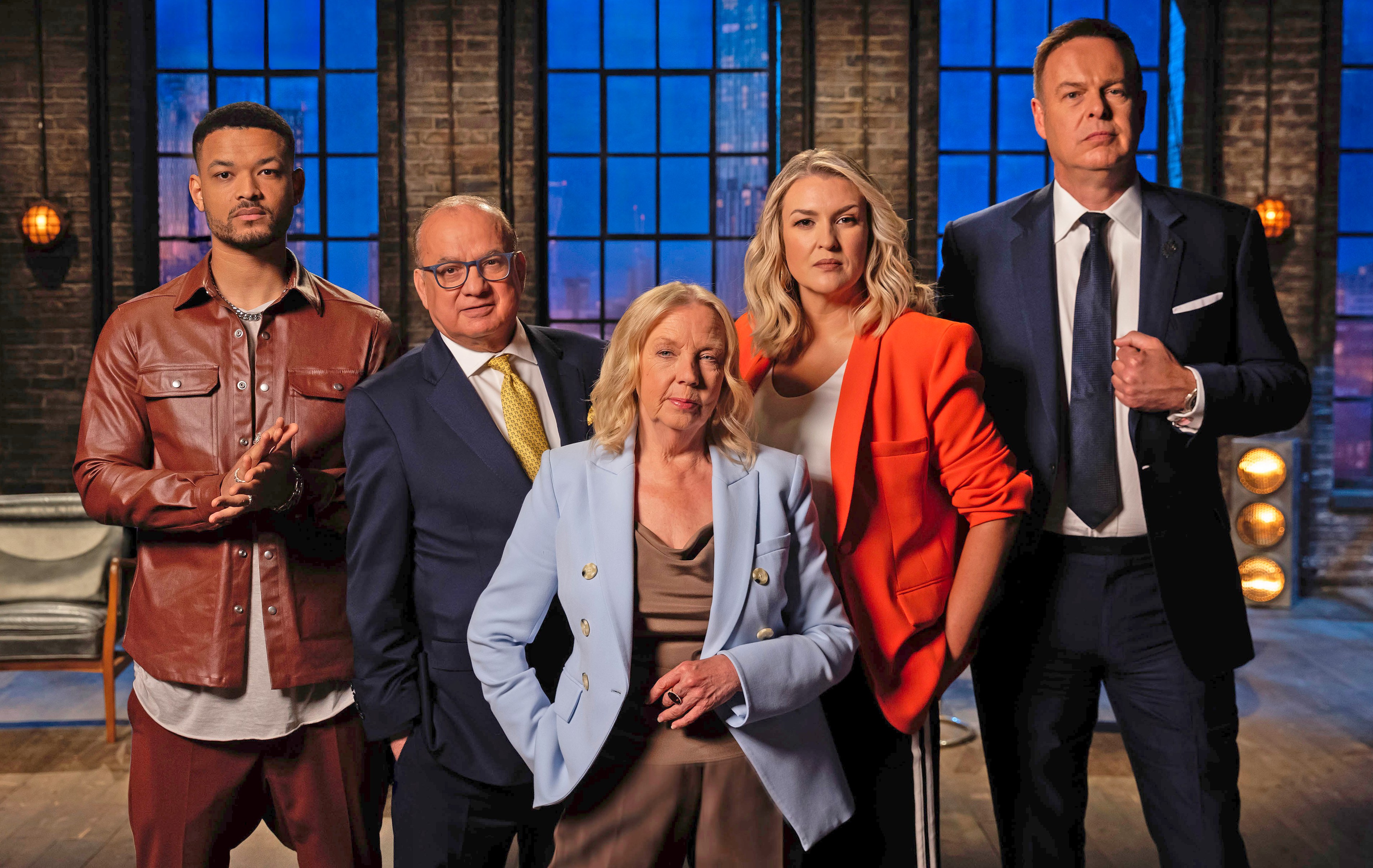
From left: Steven Bartlett, Touker Suleyman, Deborah Meaden, Davies and Peter Jones on Dragons’ Den
BBC
She is warm, funny, chatty, nobody’s idea of a stereotypical, ball-breaking boss bitch. This, she says, was flagged in her final interview and screen test (after months of many) for Dragons’ Den. An executive producer told her, “We think you’re great, but it’s Dragons’ Den, so maybe be a bit more dragony. You’re just a bit… nice.”
“I am. In business I am nice,” she says. “And I don’t compromise on that. I can still be fierce — people have learnt not to mess with me — but I’ve got loads of empathy with it. That’s the biggest skill I think I’ve had in business.”
Then, she says, there’s also the nature of her business. “People ask what you do and as soon as you say ‘craft’, they picture their grandma knitting. It wasn’t sexy. I wasn’t running a technology business in Silicon Valley. If you said you were making somebody a Christmas card, they thought you were cheap,” she says. “People have always underestimated me.”
‘It’s easy to start a business’
Davies and her sister grew up in the village of Coundon, near Middlesbrough, where her dad had his own portfolio of businesses, including an ice-cream van, a mobile sweet shop, a double-glazing business and transportation — “He was a man with a van; well, he was actually a man with two or three vans and two or three other mans who also drove for him” — along with the Wear Valley Decorating Centre, where her mother and grandmother worked too.
From her teens, Davies planned to take over the family business, enrolling to study business at York University. “I wanted to learn how to do business from a textbook so I could teach my dad this is how business is done in the 21st century,” she says.
However, after a work placement in her third year at a small company supplying products to the craft industry, she spotted a gap in the market: handmade cards were booming, but there were no custom-sized envelopes to match.
With the help of her dad she created an envelope-folding tool, the Enveloper, which she pitched to the shopping channel Ideal World.
After her first demo, the channel ordered 8,000 units, and Davies roped in her friends to take orders over the phone while she was at tutorials. The newly launched business, Crafter’s Companion, turned over £500,000 in its first year.
In a moment of spiking unemployment and spiralling costs for students, Davies believes there’s no better time for young people to start a side hustle. “There is no reason that anybody couldn’t do it. If you really want to, it’s easy to start a business,” she says.
“You can learn anything you want on YouTube. It’s all there — you just need the belief and the passion, vision and drive, and to be prepared to make sacrifices.
“I wasn’t going out drinking — I spent the whole of my last year at uni working all day on the business and studying at night. But that was my choice. That was my sacrifice.”
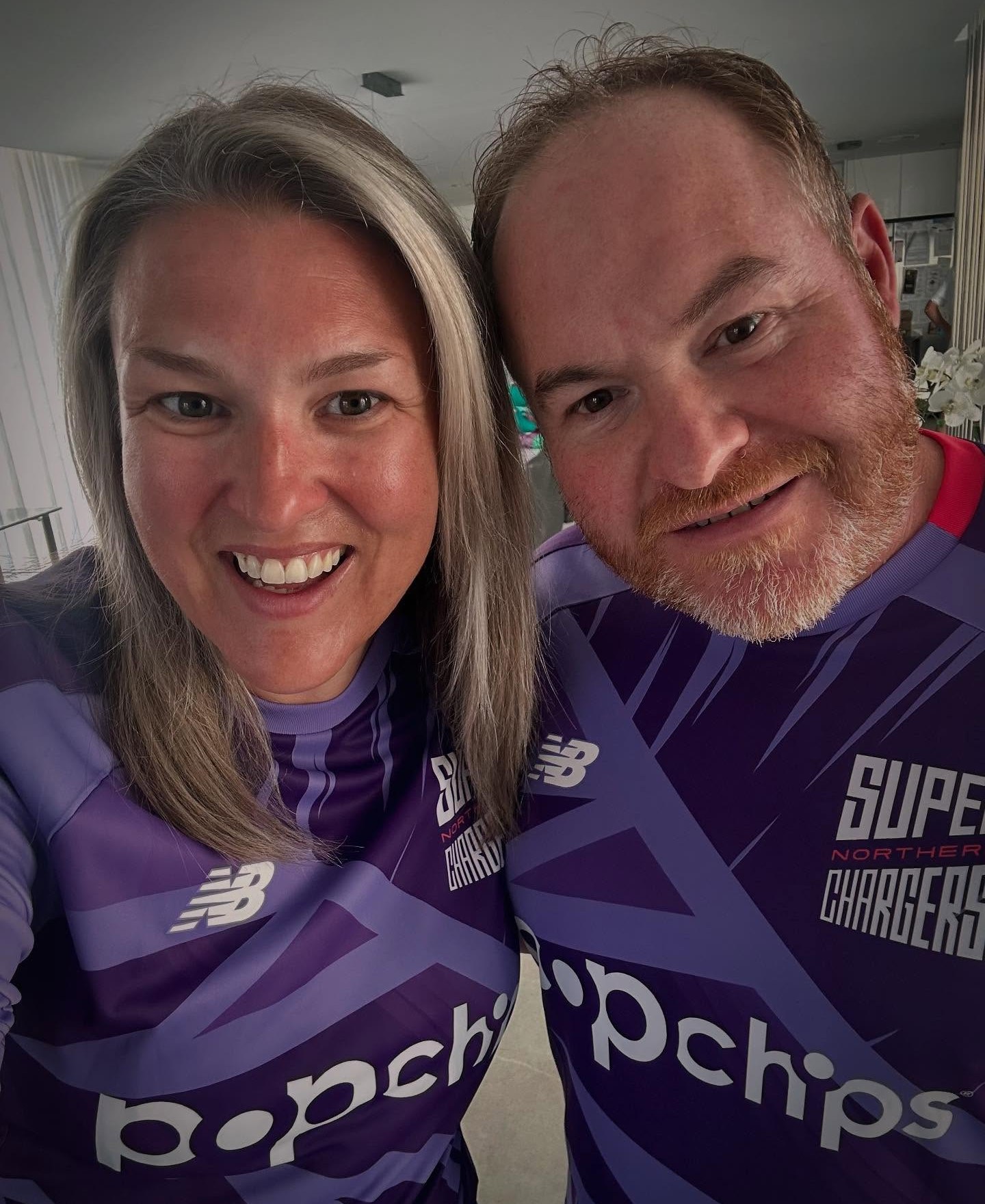
With her husband, Simon, at Lords cricket ground in August
SARADAVIESCC/INSTAGRAM
In her twenties and thirties as the business grew, expanding rapidly particularly in the US, she would sometimes clock up 150 flights a year, which brought new sacrifices. “I remember one night the kids crying and saying, ‘Why do you have to go, Mummy? Why can’t one of the other people that work for you go? Why does it have to be you?’ And I said, ‘Well, Mummy’s got to go and earn the pennies.’ ” Her husband, Simon, is an accountant for the business. “But I’m the primary breadwinner in our house and always have been.”
By 2019, Crafter’s Companion was exporting craft supplies to more than 40 countries, had three outlets in the UK, an office in California and a worldwide staff of 200, with a turnover of nearly £25 million. By 2021, when Davies stepped back from day-to-day operations, “we were knocking on £38 million”.
Although northern, frugal and proud even in the glory days, Davies’ one major indulgence was the “five-star villa” they built in Spain in 2021. She admits she “went to town” on the property, near Murcia. “It’s my pride and joy.
“If I said to my mam, ‘Can I pay for you and your brother to go on holiday?’ she wouldn’t accept it. But because it’s there I can say, ‘It’s paid for anyway. You may as well go, drink my wine and use the petrol in my car, and your flight there is 60 quid,’ and she’ll go. She’s out there right now with her brother and her sister.”
With new and diverse strings to her bow — including a burgeoning television career and an eight-week stint on Strictly Come Dancing in 2021 (“I felt like it was the biggest opportunity of my life, and something purely for me”) — Davies was still a shareholder at Crafter’s Companion, but the investment company had installed a new CEO and, “They weren’t running the business the same way I would and it didn’t work,” she says. Revenue had fallen by 21 per cent to £29.9 million and in March 2023 and 2024 the company recorded pre-tax losses of £5.1 million and £6.7 million respectively.
Three days before Christmas last year, Davies received news that the company, having already shed half its staff, was being put into administration.
“We were in Spain with all the family and I said to Simon, ‘I’m going to buy it back. We can’t let the business go.’ ”
They bought Crafter’s Companion for just £425,000, plus debts of £16.7 million.
What percentage of that £425,000 was an emotional purchase? “Oh, 100 per cent,” Davies says without hesitation. “It would have killed me to let it go. It’s exactly the sort of thing business books would tell you not to do — act with your heart and not your head — but it wasn’t the business; it was the people. I did it for the staff. Some of those people have worked for me for 10, 15 years, and it’s the northeast — jobs aren’t easy to come by.
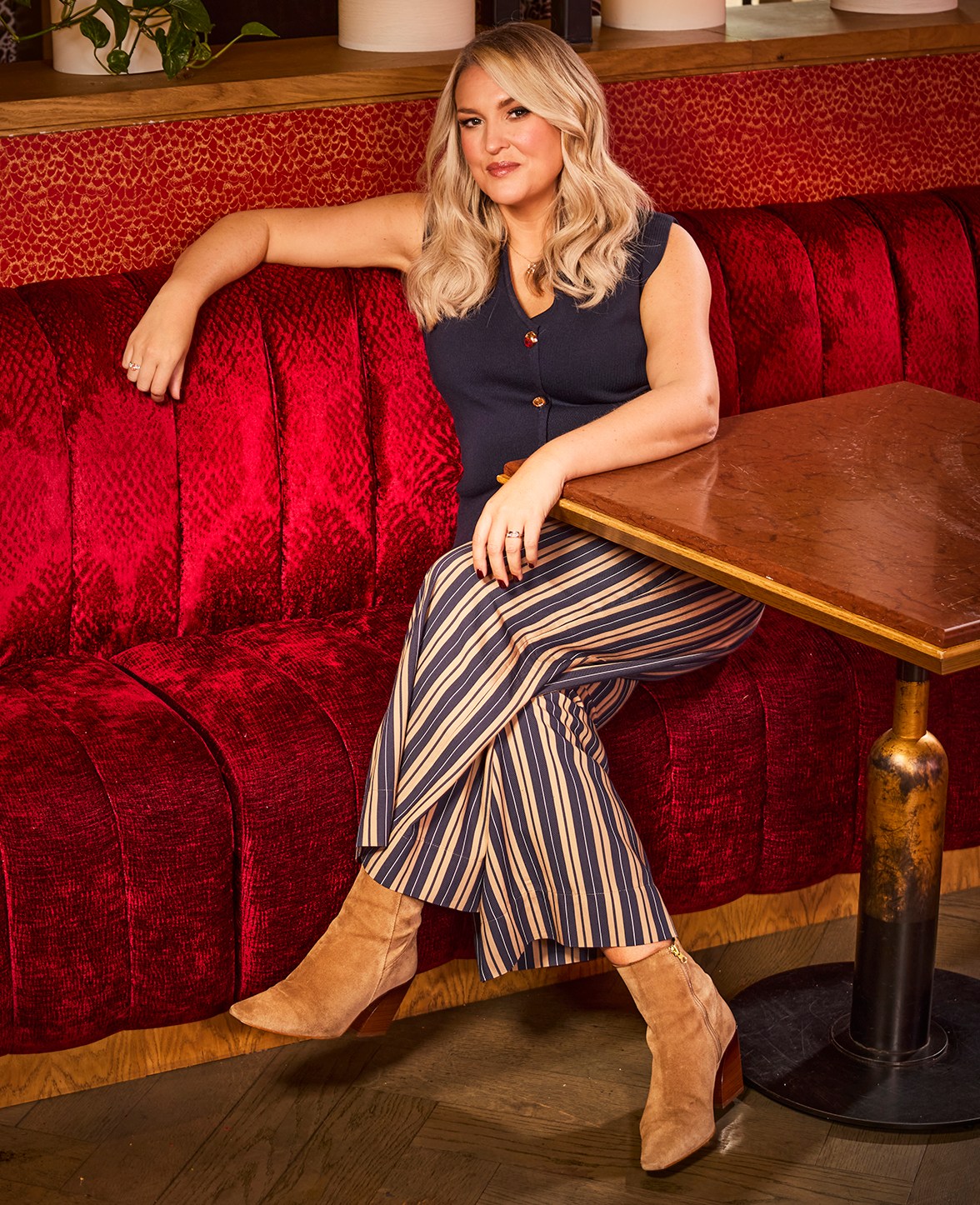
“If it’s stable growth and jobs are secure, that is brilliant. I don’t need to take on the world”
JUDE EDGINTON FOR THE TIMES MAGAZINE. MAKE-UP: LYDIA BARNES USING SCULPTED BY AIMEE. HAIR: LISA DAVEY USING PLATINUM LENGTHS AND SAM MCKNIGHT
“The brand would have lived on; someone would have bought it,” she says. “And I don’t think any of the staff would have held me accountable. But I would have held me accountable, because I was the only person who could do something about making sure they still had a job.”
Ten months on, the business is more stable but turmoil has continued with Trump’s imposition of tariffs. “About 60 per cent of our direct to consumer business was in the US and that stopped overnight,” says Davies, who scrambled to find a distribution warehouse in the US.
“I have learnt more about business in the past year than I have in the 20 years before it,” she says. “But you become more and more resilient.”
She has huge sympathy for smaller craft companies that cannot weather such bombshells. “For many small companies when hard times hit, they don’t know how to cope. They just batten down the hatches and think, we’re going to ride this out. It was the same post-pandemic,” she says. “There’s nothing to ride out; you need to adapt and change. There’s no waiting for this storm to pass. You’ve got to learn to dance in the rain.”
Ironically, she says, while Covid was bad for business operations, causing huge supply-chain issues, it gave crafting a boost. “It was already becoming bigger — the idea of making something, giving your time rather than buying something. Then the pandemic hit and everybody’s crafting,” she says. “There are ‘crafternoons’. People are talking about the mental health benefits of crafting. Tom Daley’s knitting! And now it’s cool.”
Davies has deliberately decided to be publicly nonpartisan for the sake of her sales. “I never gave my opinion on Brexit, and our crafting community in America is so diverse, I can’t afford to be divisive.
“Obviously I’m always going to say that businesses need tax breaks — any business person is going to say that,” she says. “But I think about the scale of my business, employing 100 people, and then I look at my sister, who’s running our family business now and employs 20-odd people. Even just the changes over this past year — with national insurance contributions and the minimum wage — have meant that there are two or three people they just can’t afford to employ any more. So while I appreciate that we need a national minimum wage and I agree with the principle of it, I just don’t see it being feasible for a lot of people to run a business. And if we want to get the economy moving, we’ve got to make it really appealing for people to want to start businesses.”
So does she trust this government with the economy? There is a long pause. “I mean, you’ve got to hope that what they are doing they are doing with the best intent,” she says, carefully. “And that there is a recognition and an acknowledgment that growth has to come from business, and they need to support business.”
Personally, she says, she’s no longer chasing growth like in the past. “All I used to do was chase growth, because that was exciting,” she admits. When she joined Dragons’ Den in 2019, Davies declared an ambition to see Crafter’s Companion turn over £100 million a year in ten years. Today, her hopes are more modest. “That business is now doing £12-15 million. If we plan over the next three to five years to grow it to £20 million, I’d be thrilled at that. If it’s stable growth and those jobs are secure, that is brilliant. I don’t need to take on the world.”
While she may be bidding farewell to Dragons’ Den, she’ll be a regular contestant on Gary Lineker’s new ITV game show, The Box, in early 2026. “I am a competitive person but this is definitely outside my comfort zone,” she says.
And, having caught the TV bug, she very much fancies fronting her own show too. “I just don’t want to get pigeonholed. I don’t want everybody to think, oh, she’s just the one that does business. Baking is so big on the telly — why can’t crafting be the same?” she says.
“Nobody’s shown people what teaching crafts could look like on the telly, and I can own that space.”
